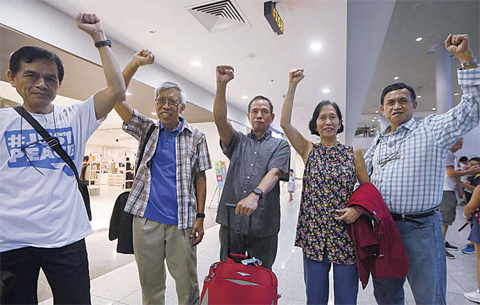 PASAY CITY: Released communist rebel leaders, from left, Renante Gamara, Alan Jasminez, Benito Tiamzon, Wilma Tiamzon and Adelberto Silva, pose with clenched fists, as they wait for their departure for Oslo, Norway for peace talks with the Government yesterday at the Ninoy Aquino International Airport. —AP
PASAY CITY: Released communist rebel leaders, from left, Renante Gamara, Alan Jasminez, Benito Tiamzon, Wilma Tiamzon and Adelberto Silva, pose with clenched fists, as they wait for their departure for Oslo, Norway for peace talks with the Government yesterday at the Ninoy Aquino International Airport. —APMANILA: The Philippine government and communist guerrillas have agreed to ceasefires from yesterday, both sides said, ahead of crucial peace talks next week to end one of Asia's longest insurgencies. Both sides said a break from the fighting will create a conducive environment at the negotiations next week in Norway, which are aimed at reaching a political settlement after 30 years of failed talks.
The Communist Party of the Philippines declared a seven-day unilateral truce hours after President Rodrigo Duterte's decision to free its top jailed leaders on Friday. The government responded by saying it will restore a unilateral ceasefire that was declared in July but abruptly withdrawn by Duterte just days later after a rebel ambush. "The... ceasefire will last for as long as necessary to bring peace to the land and also to provide an enabling environment for the success of the peace negotiations," Duterte peace adviser Jesus Dureza told reporters yesterday.
Dureza said he and at least six of the freed rebels were set to fly to Oslo yesterday for the talks that kick off Monday. The government estimates the 47-year-old rebellion has claimed 30,000 lives and impoverished vast swathes of the South East Asian nation. The talks, which Norway has acted as an intermediary for, broke down in 2013 after Duterte's predecessor Benigno Aquino rejected the communists' demand to free all imprisoned guerrillas. Dureza said the government expects to reach an "interim negotiated ceasefire" as soon as possible to put in place mechanisms to avoid renewed conflict, something the unilateral truce declarations do not provide.
Political prisoners
The communists said their own ceasefire would only last until August 27, but a rebel statement said they were willing to discuss a longer ceasefire with Manila. However, this would only be possible after the government freed "all political prisoners", it said, referring to 550 guerrillas detained by the government. The rebel army is believed to have fewer than 4,000 gunmen left, down from a peak of 26,000 in the 1980s, when a bloodless "People Power" revolt ended the 20-year dictatorship of the late president Ferdinand Marcos.
But the movement retains support among the poor in rural areas, and its forces regularly kill police or troops while extorting money from local businesses. After winning a landslide election victory in May, Duterte declared a unilateral ceasefire last month, but ended it five days later when a rebel ambush killed a government militia member and wounded four others. Duterte had enjoyed relatively good ties with guerrillas operating around Davao, the southern city which he led as mayor for more than 20 years.
A self-described socialist, the 71-year-old has since appointed two left-leaning personalities to his cabinet and even initially vowed to form a coalition government with the rebels should the peace talks succeed. Hours after the release of guerrilla chief Benito Tiamzon and his wife on Friday, police said they had arrested another senior rebel leader, Amelia Pond, accused of double murder, in the central city of Cebu. - AFP










